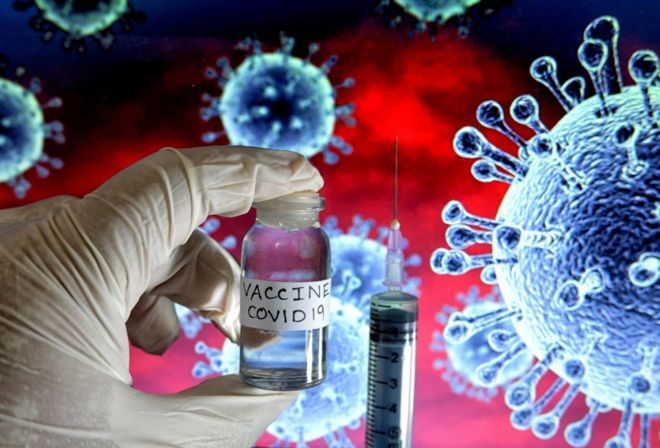
Misinformation about coronavirus vaccine trials has been spreading on social media.
 |
Misinformation about coronavirus vaccine trials has been spreading on social media.
In the week that Oxford University announced promising results from its coronavirus vaccine trial, we're looking at claims on social media about vaccines and misleading statements about their safety.
The anti-vaccination movement has gained traction online in recent years, and campaigners opposed to vaccination have moved their focus to making claims relating to the coronavirus.
Claim about the impact on DNA
First, a video containing inaccurate claims about coronavirus vaccine trials, made by osteopath Carrie Madej, that has proved popular on social media.
Carrie Madej's video makes a false claim that the vaccines will change recipients' DNA (which carries genetic information).
"The Covid-19 vaccines are designed to make us into genetically modified organisms."
She also claims - without any evidence - that vaccines will "hook us all up to an artificial intelligence interface".
There are 25 different candidate vaccines in clinical trials around the world according to the World Health Organization (WHO), but none of them will alter human DNA and they do not contain technology to link people up to an artificial intelligence interface.
The vaccines are all designed to provoke an immune response by training our bodies to recognise and fight the virus.
Carrie Madej makes a number of other false claims, including that vaccine trials are "not following any sound scientific protocol to make sure this is safe".
"New vaccines undergo rigorous safety checks before they can be recommended for widespread use," says Michelle Roberts, BBC online health editor.
We have asked Carrie Madej for comment about these claims, but have received no response at the time of publication.
Where has the video been shared?
It was first uploaded to YouTube in June, where it clocked more than 300,000 views, but it has also been popular on Facebook and Instagram.
It's still circulating in the United States, the UK and elsewhere.
A scientist in South Africa, Sarah Downs, who writes under the alias Mistress of Science, said she was alerted to the video by her mother whose prayer group had shared it.
The scientist sent her own debunking information to this group and says: "They are now much better informed, which I'm so glad about, because they were all taken in by that video."
Claims about the pace of vaccine trials
When the preliminary results of the Oxford coronavirus vaccine study were published on Monday, the topic provoked much debate in coronavirus-focused Facebook groups.
Some Facebook users posted comments saying they didn't want the vaccine as they felt they would be used as "guinea pigs" and that it had been "rushed into production at warp speed".
While there might be concerns about safety given the accelerated pace of development, Prof Andrew Pollard, head of the Oxford Vaccine Group, told the BBC the rigorous safety processes included in all clinical trials were in place.
This includes safety reports to regulators in the countries taking part.
The trial has been so fast in concluding the first two phases because of the head start provided by previous work on coronavirus vaccines in Oxford, the acceleration of administrative and funding processes, and the huge interest in the trial which meant no time was spent searching for volunteers.
As the trial moves to its third phase, with thousands more volunteers taking part, all the participants will be monitored for side-effects. There were no dangerous side-effects from taking the vaccine in the first two phases, though 16-18% of trial participants given the vaccine reported a fever. Researchers said side-effects could be managed with paracetamol.
When the Oxford vaccine trial first started, there was a claim that the first volunteer had died.
The story was quickly debunked by fact-checkers and the BBC's medical correspondent, Fergus Walsh, conducted an interview with the volunteer.
Claims about vaccines and Spanish flu
A meme circulating on social media claims vaccines were responsible for 50 million deaths during the Spanish flu pandemic in 1918.
But this is completely wrong.
Firstly, as the US Centers for Disease Control states, there was no vaccine at the time.
Scientists in Britain and the US did experiment with basic bacterial vaccines, but these were not vaccines as we would recognise them today, says historian and author Mark Honingsbaum.
This was "for the good reason that no-one knew that the influenza was a virus".
There were two main causes of death - the initial flu infection or from the strong enormous immune response the virus triggered leading to lungs being filled with fluids.
(Source: BBC)





